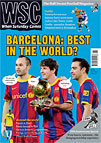 Glen Wilson examines at a new online TV venture which looks set to maintain the general trend towards manufactured controversy
Glen Wilson examines at a new online TV venture which looks set to maintain the general trend towards manufactured controversy
We have all received emails that though provoking initial interest, we know to be bad news. We are tuned in enough to realise he is not really a retired Nigerian general, that millions of single women are not actually waiting online specifically for us and that, ultimately, despite the “scientific proof”, it is unlikely to add two inches. In July I received such an email, this time from a “brand new TV sports channel”, and it proved another which promised a lot and delivered only disappointment.
The email came from Sports Tonight Live, an online TV channel set to launch at the start of the Premier League season. “We will broadcast from 7pm-11pm every night and will discuss, debate and deliberate over the big sporting stories of the day.” This sounded promising enough, but things went downhill rapidly. “We are aiming for an opinionated and entertaining discussion show, led by presenters which include Mike Parry.” And kept going. “The new channel is being backed by a group of city investors, including Kelvin Mackenzie.” Some sales pitch.
It landed in my inbox because Sports Tonight were in the process of recruiting fan representatives of each club to appear on the show. “We’re looking for someone who is eloquent, opinionated, informed – controversial but clean cut,” read the email though the appointment of Parry would suggest that two out of five would ultimately suffice.
“Ideally they would also need a bit of banter” – banter of course having become a quantifiable commodity since professional footballers began referring to people as “tweeps” and hanging out with James Corden – “and a thick skin as we aim to be controversial, with Parry at his outspoken best.”
It is often suggested there is too much football on television. Perhaps a better argument is that there is not enough actual football in relation to the coverage which surrounds it. This is an argument that Sports Tonight, having outlined three aims, to be controversial, opinionated and entertaining, only further enforces. Would it pain Sports Tonight that much to strive to be informed, or accurate instead, or perhaps seek a presenter who is lauded for being intelligent rather than outspoken?
But this is the direction in which much football reportage continues to stumble, with the game itself increasingly subsumed beneath opinion masquerading as fact. Coverage of the sport is becoming less about the game on the field and more about what is happening around it, all delivered in basic cliched rhetoric. “Football programming” of this level is akin to going to the local cinema only to find that instead of screening films they are just dishing out copies of Heat magazine. Here you go, flick through that. I know it is the artistry of cinematography you really enjoy, but have you seen George Clooney’s new beard?
Increasingly, and disappointingly, football comes down not to knowledge, but who can shout the loudest. Earlier in the year Sports Tonight recruited staff for its new venture with adverts featuring the line: “You will be ambitious and almost certainly yet to be discovered. Sport will be your drug and you have plenty to say but until now nobody was listening.” Would it not perhaps be wise to examine why no one was listening to these undiscovered twitching football dependents? I mean, there is a bloke who sits a few seats away from me at the Keepmoat Stadium who has plenty to say and nobody is listening, but I (and anyone within ten seats) would sooner see him sectioned than behind an exciting new television channel.
The email also featured a familiar line, one which I see regularly in correspondence I receive: “We will not be able to pay people for appearing on Sports Tonight Live, but… we’ll happily acknowledge and advertise your fanzine.” Football bloggers are being increasingly looked on by those at the top of the media tree as freelancers with an emphasis on the “free”. And yes it may be our hobby, but if Parry is being paid to trot out soundbites and be “at his controversial best” about clubs he knows little about, why should comparative experts be expected to give their time and insight for free?
Speaking to the Guardian in May, McKenzie described the venture as “Sky Sports News meets TalkSport”. I cannot think of anything the game needs less and so, as you have probably guessed, I declined my invitation to be involved with his “exciting new programme”. Besides, the exposure it would have brought my fanzine is nothing compared to the investment I have recently been promised in a much more encouraging email from an exiled Ugandan prince.
From WSC 296 October 2011


